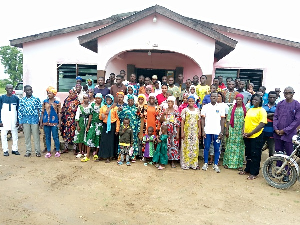 Participants of the two-day workshop
Participants of the two-day workshop
The National Peace Council (NPC), a statutory peace institution of Ghana, has trained 50 young people as peace ambassadors in Dorimon in the Wa West District of the Upper West Region, ahead of the 2024 general elections.
The training, held on August 23 and 24, 2024, covered interactive knowledge-sharing sessions and practical activities on information literacy, peacebuilding, and social cohesion.
The youth were immersed in a two-day workshop aimed to equip them with relevant knowledge in identifying, responding to, and countering hate speech, disinformation, and misinformation.
The participants were expected to become ambassadors of peace in the community and to further imbibe the principles of peaceful co-existence among community members especially as the 2024 general elections draw nearer.
Speaking to Info Radio at Dorimon, the Executive Secretary of the NPC, Mr. George Amoh said the training was aimed at building the capacities of the young people in the community to be promoters of peace and harmony throughout the electioneering period and beyond.
He added that the training was targeted at communities that were identified to be prone to conflicts due to histories of social and political abrasions and prevailing happenings.
"We have decided to come to most communities in the northern part of Ghana ahead of the elections, particularly areas where we believe conflicts can potentially occur. We are here this time to share knowledge on hate speech, intemperate language, [and] divisive attitudes that are not healthy for our democracy and for the cohesion of our country," he said.
Mr. Amoh said the youth were targeted with the training because they were vulnerable in election situations and could be used to foment political violence.
"The youth becomes very vulnerable in terms of elections, particularly those who are not gainfully employed. Their services sometimes may be used by a politician for purposes that may not help the cohesion we require," he added.
He said the NPC has developed a manual of intemperate language and indecent expressions which is being shared widely among the Ghanaian populace to foster harmony and build sectorial tolerance.
Prof. Samuel Marfo, a Conflict Resolution lecturer at the SDD University of Business and Integrated Development Studies (SDD UBIDS), who facilitated the training, said the youth were recognized as positive drivers of change if their enthusiasm and energies are channeled towards driving such changes.
He noted that even though the youth possess the willpower to bring positive change to their communities, they were mostly being used "unjustifiably" due to ignorance.
Prof. Marfo, who is a member of the Upper West Regional Peace Council, thus, said training the youth as peace ambassadors was to enlighten them about the enablers of conflict and empower them to prevent conflicts in their communities.
Nafisah Issahaku Tambu, a participant, said "Voting is not about violence. If there's violence in the society, we'll lose a lot of lives, children [and] property, so I encourage all the community members to come together so that we'll bring peace into the community."
"When I was coming here, I never knew there's something called hate speech, I never knew there's something called misinformation and that of disinformation, but during the training, I learned about these."
“I’ll let the youth also know that though we have the strength to do any other thing if we don’t promote peace and we want to bring violence, if there will be any destruction, we too will not be saved," Mr. Fatawu Samwini, another participant, said.
The training, supported by the Peacebuilding Fund of the United Nations, formed part of the NPC's coordinated peace campaigns which were being implemented in selected communities within the Upper West Region, northern Ghana, and other parts of the country.